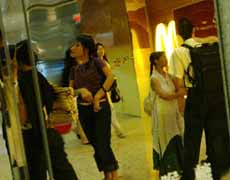|

 
Mobile clubbers gather at IFC, discuss strategy, and then get down and
dance.
Move over flash mobbing, say hello to mobile clubbing,
the latest craze for the discerning surrealist looking to indulge in a touch of
madness.
While flash mobbing appears to have had its day - a
trend that began in New York, with hordes of people turning up in public places
after receiving SMS or internet instructions to perform random acts - the mobile
nightclub movement is having a bash at making its mark here.
It entails people being directed to a place where they
simultaneously plug in their iPod earphones and dance to their chosen tunes, to
the bemusement of passers-by.
These crowds may look like a bunch of crazy
avant-garde headcases, but it's actually about art, says Annie Lok, a
British-born Chinese choreographer in her 20s, who brought the movement to Hong
Kong with two of her English friends from London, where the mobile clubbing fad
was born.
To be more specific, it's a no-nonsense body-art form,
says Lok. "It's mobile because there's not a fixed place for this,"
she says. "And it's like dancing in an open-air club - thus clubbing. We
aim to offer people something else, some alternatives, to make them feel
happy."
Lok brought the movement to Hong Kong last month, when
she came to visit her elder sister, Mimi, who is now also a devotee of mobile
clubbing.
The clubbers were directed to One IFC on Wednesday
night. Instructions on one website read: "Just turn up at the destination
at the exact time, bring your own personal stereo or radio, stick on your
favourite tunes and dance for as long as you like." And not just dance, but
walk around seemingly aimlessly, run, nod, tap a finger, or just shake your
body. It can be difficult to tell a clubber from a shopper. Although there are
telltale signs: headphones, a lack of shopping bags . . . and security guards
closing in.
"It's not something exclusive or detached, but we
try not to intrude into our surroundings," says Lok. "No talking, no
looking, just dancing to our tunes. If passers-by feel it's fun, that's
fun."
Mimi Lok, a language teacher at Maryknoll Convent
School in Kowloon Tong, admits it looks crazy. "But it's actually quite
liberating," she says.
Mobile clubbing was born from a passion for dancing
shared by Lok and two close friends, musicians and visual artists Emma Davis and
Ben Cummins, who started the trend last year in London by inviting friends to
bring their MP3 players or Walkmans to London's Victoria train station at rush
hour and dance - much to the confusion of commuters.
"The response in London was really
exciting," Lok says. "Londoners are often considered reserved. Still,
many people joined us and danced at the station.
Some were over 50.
"We like to hold events in crowded places, where
there's a lot of business going on - places that are serious and formal. We just
like people to slow down a bit to enjoy and have fun."
About 10 to 20 clubbers were expected at One IFC. Only
six showed up. "It's basically spread by word of mouth, and it's still very
much underground," says Mimi Lok, who insists the movement will gain
momentum.
At 8.10pm, the casually dressed group of six disperse
among the crowd in the west entrance area of the upmarket office and shopping
complex to do their thing. Clubber Saffron Leung, who is in her 20s, is quick to
catch the eyes of commuters, as the portrait model circles around a column while
sporadically thumping a wall with her hands.
"I think she's just a bored
attention-seeker," one passer-by whispers to a friend. Another asks:
"Is there a TV crew or someone hiding somewhere, filming?"
  Photos:
Oliver Tsang SOUTH CHINA MORNING POST Photos:
Oliver Tsang SOUTH CHINA MORNING POST
Arvin Cheng provokes plenty of
raised eyebrows, and all draw a posse of security guards
Seemingly making senseless movements, fellow clubber
Arvin Cheng appears so absorbed in the music that his head never stops violently
nodding as he wanders aimlessly.
"I think it's street performance," says
Mathew Cheung, a 34-year-old property consultant from Kwun Tong. "I've
never seen anything like this before. Mobile what? I think it's quite
amusing."
Bank teller Emily Lai, 24, from Wan Chai, says:
"Perhaps Hong Kong people's work pressure is really too much. I hope
they're not going mad."
The property's management staff, however, aren't so
amused. Fifteen minutes in and a group of stony-faced security guards approach.
They whisper among themselves before eventually calling for back-up.
"Listening to music, walking around, shaking
their body, no problem," says another guard. "But if it's a group
activity with some special aims, sorry, prior permission is needed."
With that, the dancers hastily move to the footbridges
outside the mall. An hour after starting, they quietly finish up.
"Why should they complain?" says Cheng, 40,
an administrator at an education institute. "We're not disturbing anyone.
Actually, we're trying not to have any interaction with passers-by. If one
person sees another person doing something that person might not want to do, why
should he complain? To club is to enjoy and give pleasure to others, not to
argue."
Leung agrees. "Purely out of curiosity, I did it
for the first time at the Admiralty MTR station and I'm hooked," she says.
"There's a lot of fun in it. I joined this time, not because of any burning
desire to show others how cool I am, but because it seems like fun."
The first mobile clubbing session at Chater Road in
early June attracted five participants, mostly close friends of the Loks. Word
of the new movement spread. Thirteen people turned up for the Admiralty MTR
event on July 7, and danced for about an hour. The location of the next clubbing
event hasn't been decided.
The Loks have no intention of making it members-only.
"It wouldn't match the original aim if we were to form a club and register
membership," says Annie Lok. "We're not forming a performing company,
but aim to simply provide pleasure.
"It's something me and Emma and Ben talked about
for months during brainstorming sessions in the pub. No one smiles in stations.
Mobile clubbing is basically a way of getting people to interact, and making
people feel more relaxed."
The movement has been brightening up London and some
parts of Europe since last September. Whether it takes off in Hong Kong remains
to be seen. But one thing seems clear: you, too, can be a star - even if it's
only for 15 minutes. - July 23 2004 SOUTH
CHINA MORNING POST

|